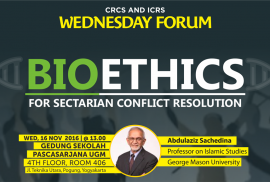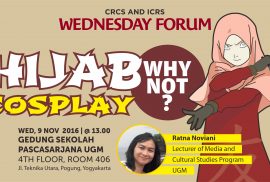
Abstract
Although secular bioethics avoids any entanglement with religious issues, bioethics has the goal of advancing the relationship between the physician, the patient and the patient’s family in medical practice and research, even in tense moments of disagreements in the clinical situation. My involvement in Islamic bioethics, which asserts principles like asserting that bio-ethical principles like “No harm, no harassment” and maslaha or public interest, makes me confident in asserting that two universal principles, which are already operative in the healthcare institutions around the world, can establish peaceful coexistence between members of various communities. These are the value that demands acknowledgment of human equality based in inherent human dignity and the value that teaches humans to relate to one another in sincerity, sensitivity, and a deep sense of sacrifice. I argue they must be applied across all levels of interpersonal relations and interactions.
Speaker
Abdulaziz Sachedina, Ph.D., is Professor and IIIT Chair in Islamic Studies at George Mason University in Fairfax, Virginia. Dr. Sachedina, who has studied in India, Iraq, Iran, and Canada, obtained his Ph.D. from the University of Toronto. He has been conducting research and writing in the field of Islamic Law, Ethics, and Theology (Sunni and Shiite) for more than two decades. In the last ten years he has concentrated on social and political ethics, including Interfaith and Intra-faith Relations, Islamic Biomedical Ethics and Islam and Human Rights.
Islamic
Abstract
The Islamic Otaku Community (IOC) is an Islamic fan-based community, which encourages young Muslims—male and female—who are actively engaged in otaku fandom to stay committed to Islamic norms and values. Hijab Cosplay can be perceived as a unique site which brings together two worlds, the sacred/ascetic activities of being a Muslimah and the secular/hedonistic activities of the otaku, in which young Muslimah not only choose, appropriate and reproduce characters from Japanese anime, manga and games, but also (re)claim their femininity as Muslimah in relation to it. In this talk, I aim to discuss how Muslim femininity is remediated through the practice of hijab cosplay, which is posted and circulated on the IOC fansite, and how the female dressed body as a mediation of femininity is actively mediated in another medium. Since the goal of remediation is to refashion or reform the earlier version of the medium, I consider the ways in which young Muslimah attempt to refashion and reclaim Muslim femininity through fandom practices. Since cosplay is not confined to the act of costuming, but is also immersed in wider fan practices, I also look at the remediation of Muslim femininity in Islamic Mangaka (fan arts and fans writing produced and posted by IOC members).
Azis Anwar Fachrudin | CRCS UGM | Opinion

Despite the fact that Jakarta Governor Basuki “Ahok” Thahaja Purnama has apologized for statements made regarding the Quranic verse Al-Maidah 51, some Islamic groups are saying that an apology is not enough. Protestors demanded that Ahok be criminalized in a rally last week in Jakarta.
Deputy secretary-general of the Indonesian Ulema Council (MUI) said on a TV show that religious defamation must be punished by “death, crucifixion or at least hand amputation and expulsion”. Even though he did not urge the state to adopt such a policy, but rather called on the processing of the case in accordance to the law on religious defamation, his remarks give the impression that Islamic law is that harsh.
The Quranic verses quoted by the MUI deputy secretary-general are known as the hirabah verses. Hirabah, which literally means “warfare”, and the verses were basically applied under the principles of Islamic jurisprudence to crimes such as highway robbery, piracy, unlawful rebellion and sedition. The verses were the same verses used by the Islamic state (IS) group to justify its crucifying of those waging war against IS.
Therefore, the attribution for those punishments for alleged religious defamation is dangerous.
What is more saddening is that Islamic groups are pushing for Ahok to be criminalized when he had no intention of insulting Islam or the Quran. The groups are insisting that the literal out-of-context interpretation of al-Maidah:51 is the only correct one. They take for granted that the verse literally prohibits non-Muslims from being a “leader” in a Muslim country.
The word auliya is not translated as “leader” in most contemporary translations as well as tafsir, the consequence of that translation is dangerous: non-Muslim ministers, regents, even bosses in companies where Muslims work are also leaders, aren’t they? Must they be dismissed from their positions just because of the verse?
The verse will only make sense if understood in its context, that is, in a situation of war, such as when the Jews were said to have betrayed the Muslims by violating the social contract made between the two to defend Medina together when the city-state was under attack; hence the later prohibition to make the Jews “allies” (the closest meaning to the word“auliya”).
Read more http://www.thejakartapost.com/
________________________
The writer is a graduate student at the Center for Religious and Cross-cultural Studies (CRCS) at Gadjah Mada University, Yogyakarta.




